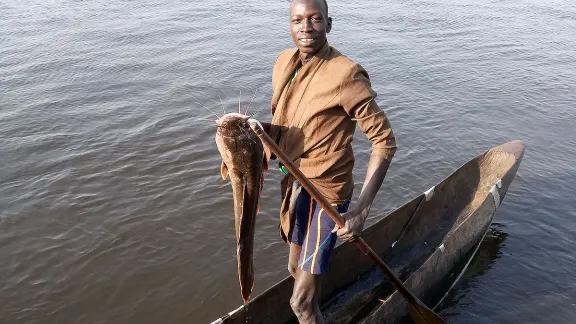
Fisherman Kur Kuany in his boat. Photo: LWF South Sudan
Tools and market access for fishermen in war-torn South Sudan
(LWI) - For Kur Kuany (32) from the Sudd, a vast swamp surrounding the Nile River in South Sudan, there are not many options in life. The father of two can either fight in one of the rebel forces or the government army, or try to make a living by raising cattle or fishing. He chose the latter. The Lutheran World Federation (LWF) supported him and his colleagues at the local cooperative to fish rather than fight.
South Sudan is the world’s youngest country. However peace has been elusive since it declared independence from Sudan in 2011. After conflict re-erupted in December 2013 nearly 4 million people have been displaced and half of the population faces extreme hunger.
With more than two million refugees outside the country, the South Sudanese civil war has become Africa’s largest refugee crisis. LWF continues to provide assistance under often challenging circumstances inside South Sudan and in the countries receiving the refugees.
Conflict over resources
It is in this hard place where Kur Kuany tries to make a living as a fisherman. Public services such as roads, electricity and means of communication are far and few between. Due to the widespread insecurity and conflicts between communities, children are abducted regularly. Cattle raiding is also common, and so is conflict over pasture and water resources, turning livestock farming into an insecure source of income. More than one third of the children in the county are severely malnourished, while countless women face gender-based violence.
Half of the people of Twic East, some 270.000 people, depend partly or fully on fishing for their livelihood. Still, although there is an abundance of fish in the Nile, Kuany struggled to make ends meet until recently. “Even when I had a good catch it was tough selling the fish at a good rate,” remembers the young fisherman. “I either sold my catch at a cheap rate in the village, or walked all the way to Dhiam-Dhiam, carrying the fish on my head. The journey took me two days.”
Because of the market problems, fishermen like Angelo Kuany faced difficulties supporting their families. Another obstacle was the way in which the fish was preserved, through drying in the sun, causing the fish to rot quickly.
From the river to the market
Realizing the great potential of fishing in the Nile area, LWF over the past years supported the fishing community of Twic East with fishing gear and training on new techniques in fishing, preservation, and marketing. But the problem of market access remained. “Traders from cities such as Bor and Juba occasionally came to the village but we were forced to sell the fish at a low rate,” says Kuany.
We collect fish from the different villages and use the speedboat to take it to Bor, where we get good rates. Now if traders come to the village we can offer them better products and have much better bargaining power.
In the absence of roads and effective transportation, a novel solution was found: speedboats. Kuany’s fishing cooperative was provided with a motorboat to transport fresh fish to the market in the State capital Bor. It has made a difference in the lives of the young fishermen. “We collect fish from the different villages and use the speedboat to take it to Bor, where we get good rates. Now if traders come to the village we can offer them better products and have more bargaining power,” says Kur Kuany.
In war-torn South Sudan, fishing has great potential to reduce malnutrition especially of children, and to improve general food security and increase employment and income opportunities. Through its work LWF supports 400 members belonging to two fishing cooperatives. Each member in turn supports around six family members.
The work supported by Australian Lutheran World Service (ALWS), the Evangelical Lutheran Church of America (ELCA), the German National Committee for LWF (GNC/LWF) and Church of Sweden (CoS).
In addition to supporting fishermen in improving their livelihoods, LWF supports Twic communities by improving access to education, building capacity in crop production, promoting child protection and fighting gender-based violence and other forms of human rights violations.


